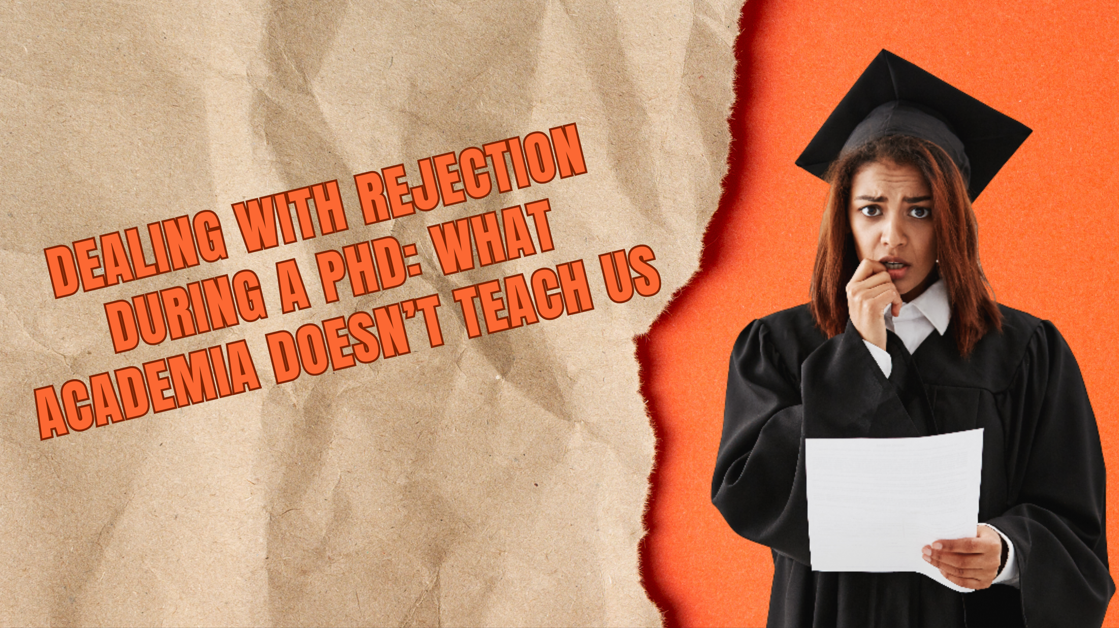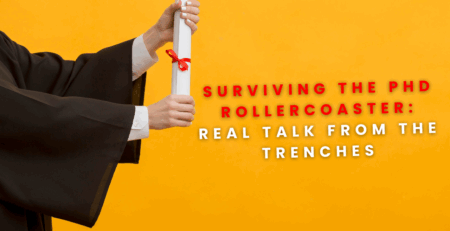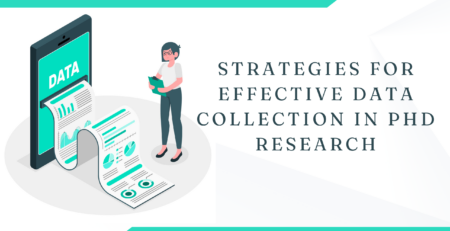Dealing with Rejection During a PhD: What Academia Doesn’t Teach Us
Kenfra Research - Shallo2025-06-06T16:44:22+05:30Rejection is a silent companion throughout your PhD journey. From declined journal submissions and fellowship denials to critical supervisor feedback and missed conference opportunities—Rejection During a PhD comes in many forms. Yet, this is one topic academia rarely prepares scholars for. While you’re trained to conduct rigorous research, write scholarly papers, and meet publication standards, no one teaches you how to deal with the emotional toll of Rejection During a PhD. And it can be brutal. It challenges your confidence, self-worth, and even your decision to pursue a PhD. This blog dives into what rejection really means during a PhD, why it hurts so much, and—most importantly—how to reframe it as part of your academic growth. Whether you’re just starting out or navigating the final years of your PhD, these tips will help you build emotional resilience and keep moving forward.

Why Rejection Hurts So Much During a PhD
Your PhD is not just an academic pursuit—it becomes part of your identity. When a paper is rejected or a proposal is criticized, it’s easy to feel like you are being rejected, not just your work.
Here’s why rejection during a PhD feels particularly painful:
- High personal investment: You’ve poured months, maybe years, into your research. A single rejection can feel like all that effort was worthless.
- Isolation: PhD research is often a lonely path. Without peers to share the emotional burden, rejection becomes even harder to bear.
- Unrealistic expectations: Academia often glorifies success stories but rarely discusses the hundreds of rejections behind them.
- Fear of failure: Many PhD students tie their self-worth to academic achievement. Rejection threatens this sense of value.
Common Types of Rejection in a PhD Journey
Understanding the types of rejection you might face helps normalize the experience. Here are the most common:
- Journal Rejections
- Most scholars face rejection from journals—sometimes multiple times for the same paper.
- Rejections may be desk rejections (without peer review) or peer-reviewed with harsh feedback.
- Conference Abstract Rejections
- Not being accepted to speak or present at a major conference can feel discouraging, especially when peers are accepted.
- Funding and Grant Rejections
- Research funding is highly competitive. Many excellent proposals are turned down simply due to limited funds.
- Supervisor Criticism
- Even constructive criticism from your supervisor can feel like rejection when you’re already mentally drained.
- Thesis Chapter Rewrites
- Having to redo chapters, sometimes multiple times, feels like your effort isn’t good enough.
- Job and Postdoc Rejections
- Reaching the end of your PhD and facing job rejections can feel like the culmination of your academic journey is a failure.
What Academia Doesn’t Teach Us About Rejection
While methods, literature reviews, and statistical analysis are all part of the PhD curriculum, emotional resilience isn’t. Here’s what we wish academia taught:
- Rejection is normal and expected.
- Even top researchers face constant rejection.
- Resilience and persistence are more important than perfection.
- Feedback is not an attack—it’s an opportunity to improve.
- You are more than your publication record.
How to Cope with Rejection During a PhD
- Don’t Take It Personally
This is easier said than done, but crucial. Rejection is about your work, not your worth. Journals reject papers for reasons ranging from poor fit to timing—often unrelated to quality.
- Read the Feedback with a Growth Mindset
Instead of immediately reacting emotionally, take time to read any feedback. Try to extract actionable advice. Use it to revise your paper or guide your next submission.
- Talk About It
Sharing your experience with fellow PhD scholars, mentors, or academic communities can normalize rejection. You’ll quickly realize everyone faces it.
- Reframe the Rejection
Ask yourself:
- What can I learn from this?
- What will I do differently next time?
- How does this help me improve as a researcher?
Rejection is feedback in disguise.
5. Celebrate the Effort
Submitting a paper, applying for a grant, or presenting your work takes courage. Celebrate the fact that you showed up, regardless of the outcome.
- Keep a ‘Resilience File’
Maintain a document or journal that lists your small wins: positive reviewer comments, praise from your supervisor, a successful presentation, or even good feedback from peers. Review it when you feel low.
- Try Again Strategically
If a paper is rejected from one journal, revise it and submit elsewhere. Sometimes, all it takes is a better fit between your topic and the journal’s scope.
Stories of Famous Academic Rejections
Even the best have faced academic rejection:
- Albert Einstein had his doctoral dissertation rejected once.
- Stephen Hawking’s first paper was rejected for being “too speculative.”
- Marie Curie applied to several institutions before getting a research position.
Knowing that academic giants faced rejection can be surprisingly comforting.
Long-Term Perspective: Rejection Builds Resilience
Rejection during a PhD often feels like a step backward. But in the long term, it can become your greatest teacher.
- It trains you to detach emotionally from outcomes.
- It teaches you to revise, rework, and improve.
- It fosters persistence—one of the most valuable academic skills.
- It builds thick skin, which you’ll need for future peer reviews, job hunts, and more.
Tips for Supervisors and Mentors
If you’re a mentor, here’s how you can help PhD scholars handle rejection better:
- Normalize it early and often.
- Share your own rejection stories.
- Provide constructive feedback and encouragement.
- Help students reframe setbacks as part of academic growth.
- Remind them that one rejection does not define their journey.
Final Thoughts
Dealing with Rejection During a PhD is a skill. It’s one that’s rarely taught, yet deeply essential for surviving and thriving in academia. By reframing Rejection During a PhD, seeking support, and focusing on long-term growth, you can turn every “no” into a stepping stone toward a stronger, more resilient version of yourself. Remember, every academic success story is built on a mountain of rejections. The key is not to avoid them—but to learn, grow, and keep going.
Kenfra Research understands the challenges faced by PhD scholars and offers tailored solutions to support your academic goals. From topic selection to advanced plagiarism checking.








Leave a Reply